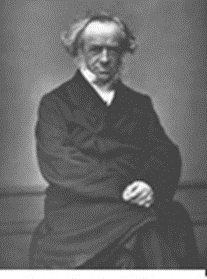Robert Smith Candlish
1806-1873
Was a leading figure in the Disruption of 1843. He served for many years in St. George's Free Church in Edinburgh's New Town. In 1820 he began studying Divinity at Glasgow University, where he graduated in 1823. During the years 1823–1826 he went through the prescribed course at the divinity hall. On leaving, he accompanied a pupil as private tutor to Eton College, where he stayed two years. In 1829 Candlish entered upon his life's work, having been licensed to preach during the summer vacation of the previous year. After short assistant pastorates at St Andrew's Church, Glasgow, and then the parish church of Bonhill in Dunbartonshire, he became assistant minister to Mr. Martin of St George's, Edinburgh. He attracted the attention of his audience by his intellectual keenness, emotional fervour, spiritual insight and power of dramatic representation of character and life. He gathered round him one of the largest congregations in the city. In 1840 he was living at 9 Randolph Crescent in Edinburgh's West End, a huge, terraced townhouse. Candlish took an interest in ecclesiastical questions, and he soon became involved in the struggle which was then agitating Church of Scotland. His first Assembly speech, delivered in 1839, placed him among the leaders of the party that afterwards formed the Free Church, and his influence in bringing about the Disruption of 1843 was inferior only to that of Thomas Chalmers. He took his stand on two principles: the right of the people to choose their ministers, and the independence of the church in things spiritual. On his advice Hugh Miller was appointed editor of The Witness. Following the Disruption Candlish was one of the Free Churchmen who spoke in England, explaining the reason why so many had left the Established Church. He was actively engaged at one time or other in nearly all the various schemes of the church, but particularly the education committee, of which he was convener from 1846 to 1863, and in the unsuccessful negotiations for union among the non-established Presbyterian denominations of Scotland, which were carried on during the years 1863-1873. Candlish was the Free Church Moderator at the Assembly of 1867. In 1841 the government nominated Candlish to the newly founded chair of Biblical criticism in the University of Edinburgh. However, owing to the opposition of Lord Aberdeen, the presentation was cancelled. In 1847 Candlish, who had received the degree of D.D. from Princeton, New Jersey, in 1841, was chosen by the Assembly of the Free Church to succeed Chalmers in the chair of divinity in the New College, Edinburgh. After partially fulfilling the duties of the office for one session, he was led to resume the charge of St George's, the clergyman who had been chosen by the congregation as his successor having died before entering on his work. Candlish died at home, 52 Melville Street in Edinburgh in 1873. As the Free Church lost the right to burial in the traditional parish burial grounds, Candlish is buried in the non-denominational Old Calton Burial Ground.
